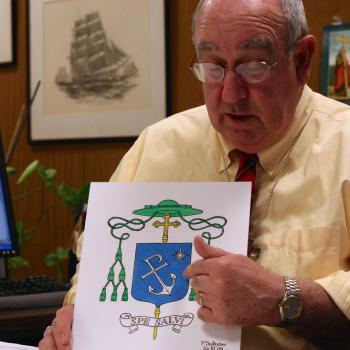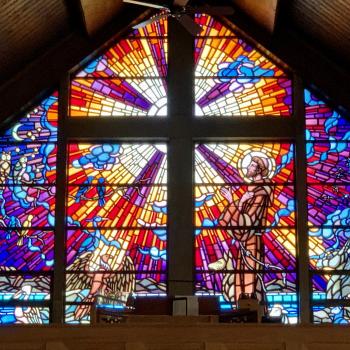I can’t recall reading anything by a member of Catholic clergy on this particular subject that is this personal.
In the blog of New Ways Ministry, Deacon Ray Dever describes his son coming out, and what followed:
Our journey has probably not been very different than the journey of any family with an LGBTQ child. It really began with our daughter descending into a deep depression during high school. We would learn more about depression and mental illness, about suicidal ideations and self-injurious behavior, about therapists and anti-depressant medications than we ever could have imagined or wanted. That journey would eventually lead to questions of gender identity that were intimately connected with her mental health struggles.
When our daughter came out, my wife and I experienced the full range of thoughts and emotions that any parents do in that situation – shock at the news, a lack of understanding of gender issues, conflict with what the Church teaches about human sexuality, confusion and guilt about what we should do as parents, profound sadness at what felt like the loss of our son, fear and worry for what the future would hold for her. There were arguments, sleepless nights, and prayers – lots of prayers.
We slowly came to the realization that we hadn’t lost the person who had been our son. In fact, in many respects we got our child back, as she embraced her gender identity and emerged from the depths of depression. All the creativity, humor, empathy, and intelligence that make her an exceptional person are still there and are shining through stronger than ever. And I’d like to think that the acceptance of her immediate and extended Catholic family have played some part in that positive transformation.
…While I am certainly not qualified or authorized to speak for the Church on LGBTQ issues, I have been commissioned by the Church through ordination to proclaim and to preach the Gospel. And if one thing is crystal clear in the public ministry and teachings of our Lord, it is that everyone is included in His love and mercy and forgiveness, and that we are all called to do the same. For those Catholic families with LGBTQ children that are struggling with what they should do, I would suggest that they look to the Holy Family. Look to the love embodied in the Incarnation, a love like no other, and embrace your children. As the Church calls us to do first and foremost, follow your conscience, love own another, and especially love your children.
A footnote: several readers have written to point out that the source for this essay, New Ways Ministry, is not in good standing with the United States bishops.
New Ways Ministry has recently criticized efforts by the Church to defend the traditional definition of marriage as between one man and one woman and has urged Catholics to support electoral initiatives to establish same-sex “marriage.” No one should be misled by the claim that New Ways Ministry provides an authentic interpretation of Catholic teaching and an authentic Catholic pastoral practice. Their claim to be Catholic only confuses the faithful regarding the authentic teaching and ministry of the Church with respect to persons with a homosexual inclination. Accordingly, I wish to make it clear that, like other groups that claim to be Catholic but deny central aspects of Church teaching, New Ways Ministry has no approval or recognition from the Catholic Church and that they cannot speak on behalf of the Catholic faithful in the United States.
It may also be worth taking a second look at “Always Our Children,” the document on this subject that was issued by the USCCB in the 1990s, which offers this advice for parents:
With a view toward overcoming the isolation that you or your son or daughter may be experiencing, we offer these recommendations to you as well as to priests and pastoral ministers.
To Parents:
- Accept and love yourselves as parents in order to accept and love your son or daughter. Do not blame yourselves for a homosexual orientation in your child.
- Do everything possible to continue demonstrating love for your child. However, accepting his or her homosexual orientation does not have to include approving of all related attitudes and behavioral choices. In fact, you may need to challenge certain aspects of a lifestyle that you find objectionable.
- Urge your son or daughter to stay joined to the Catholic faith community. If they have left the Church, urge them to return and be reconciled to the community, especially through the sacrament of penance.
- Recommend that your son or daughter find a spiritual director/mentor to offer guidance in prayer and in leading a chaste and virtuous life.
- Seek help for yourself, perhaps in the form of counseling or spiritual direction, as you strive for understanding, acceptance, and inner peace. Also, consider joining a parents’ support group or participating in a retreat designed for Catholic parents of homosexual children. Other people have traveled the same road as you but may have journeyed even further. They can share effective ways of handling delicate family situations such as how to tell family members and friends about your child, how to explain homosexuality to younger children, and how to relate to your son or daughter’s friends in a Christian way.
- Reach out in love and service to other parents struggling with a son or daughter’s homosexuality. Contact your parish about organizing a parents’ support group. Your diocesan family ministry office, Catholic Charities, or a special diocesan ministry to gay and lesbian persons may be able to offer assistance.
- As you take advantage of opportunities for education and support, remember that you can only change yourself; you can only be responsible for your own beliefs and actions, not those of your adult children.
- Put your faith completely in God, who is more powerful, more compassionate, and more forgiving than we are or ever could be.
Finally, the last word on all this belongs to the teaching office of the church, and words found in the catechism:
2357 Homosexuality refers to relations between men or between women who experience an exclusive or predominant sexual attraction toward persons of the same sex. It has taken a great variety of forms through the centuries and in different cultures. Its psychological genesis remains largely unexplained. Basing itself on Sacred Scripture, which presents homosexual acts as acts of grave depravity, tradition has always declared that “homosexual acts are intrinsically disordered.” They are contrary to the natural law. They close the sexual act to the gift of life. They do not proceed from a genuine affective and sexual complementarity. Under no circumstances can they be approved.
The number of men and women who have deep-seated homosexual tendencies is not negligible. This inclination, which is objectively disordered, constitutes for most of them a trial. They must be accepted with respect, compassion, and sensitivity. Every sign of unjust discrimination in their regard should be avoided. These persons are called to fulfill God’s will in their lives and, if they are Christians, to unite to the sacrifice of the Lord’s Cross the difficulties they may encounter from their condition.
Homosexual persons are called to chastity. By the virtues of self-mastery that teach them inner freedom, at times by the support of disinterested friendship, by prayer and sacramental grace, they can and should gradually and resolutely approach Christian perfection.











